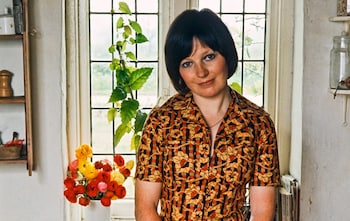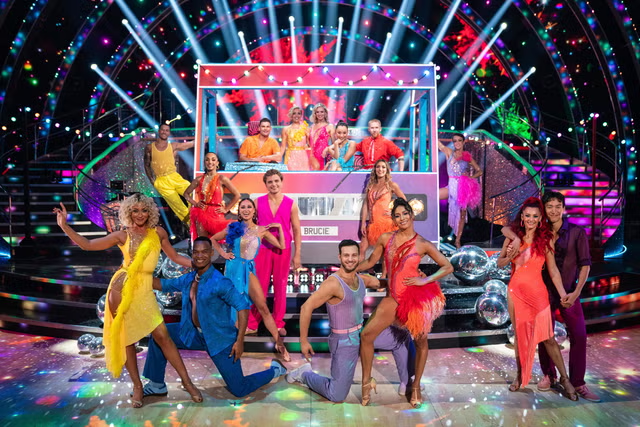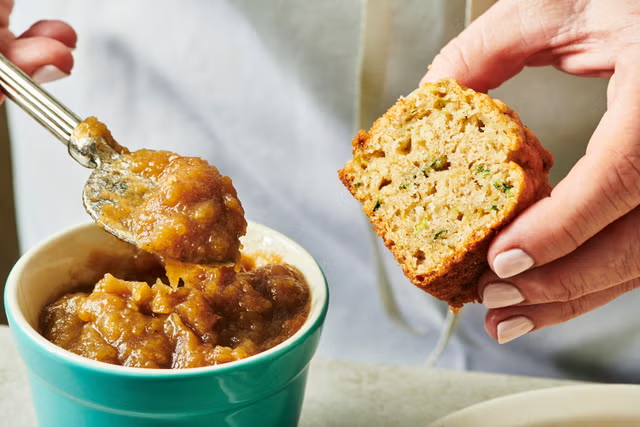What is the best washing machine to buy? It’s important to choose well. The right washing machine or washer-dryer will make laundry less of a chore, keep your clothes smelling fresh and help keep your electricity bill down, which is more important than ever in the current climate. (For another way to make laundry easier, read our guide to the best heated clothes airers.)
But what should you look for? We asked the experts. “The first thing I would say is buy cheap, buy twice,” says washing machine repair engineer Stephen Neale, also known by his moniker the Spin Doctor. “If I go to repair a machine and I can’t fix it for whatever reason, I tell customers to go for a high-end brand but a mid-range model, as the most expensive ones have features you won’t end up using, but you’d be lucky to get five years out of the cheap brands.”
Lauren Clark, large appliances expert at AO, agrees that the main advantage of top-of-the-range washing machines is smart tech: “They have WiFi connection via a smartphone and more technologically advanced programmes such as auto-dosing, steam washing, allergy cycles, or quirky features such as slots to add items to the wash even after the cycle has started.” These are nice to have, if your budget stretches to it, but as Clark says, “there are plenty of great entry level models available.”
To help you out, I’ve asked Neale, Clark and buying experts from Robert Dyas and John Lewis to recommend the best washing machines, below. If you’re in a hurry, here’s a quick look at their top five:
The best washing machines of 2024, at a glance:
- Best washing machine overall - AEG L7FEC946U 9kg
- Best value washing machine - Russell Hobbs RH914W116W
- Best washing machine for stain removal - Hotpoint NM111046
- Best washing machine for large families - LG TurboWash 13kg F4Y513WWLN1
- Best washing machine for an upgrade - Miele W1 WED164 WCS 9kg
How long should a washing machine last?
“Generally speaking, you should expect it to last between seven and 12 years,” says Louise Lee, buying manager at Robert Dyas. “To make it last as long as possible, a couple of key things to remember are to avoid overloading it and to clean it regularly, including the filters.”
Becca Hargrove, John Lewis’ category lead for large electricals, adds: “Make sure there is always enough room at the top of the drum to push your hand in and pat down your laundry.”
In terms of other tips for extending longevity, Hargrove says, “Every so often I clean my own washing machine door seal and detergent drawer with an old toothbrush and wipe them clean, to stop product building up there. And I’d also recommend carrying out an empty high temperature boil wash occasionally to flush out any accumulated dirt in the pipes.
“If you live in a hard water area, it’s a good idea to use an appliance descaler from time to time, too. This will really help to clean your clothes better, keep your machine in great condition, and make it last longer too.”
Why you can trust Telegraph Recommended
Our thorough, real-world tests will always help you find the best product at the best price. No manufacturer ever sees copy before publication and we do not accept payment in exchange for favourable reviews. Visit our Who We Are page to learn more.
How I chose the best washing machines
I spoke to buyers at AO, Robert Dyas and John Lewis about the washing machines they rate most highly, and asked how they choose which washing machines to sell at their retailers. There are three deciding factors: drum size, which should match the amount of laundry you expect to wash each time; energy rating, which tells you how much it will cost to run; and spin speed, which determines how dry your clothes will be at the end of a wash. You can find more advice from our experts in the FAQ section at the bottom of this page.
The best washing machines
1. AEG L7FEC946U 9kg
£599, AO
Best washing machine overall, 10/10
We like: lots of small, thoughtful features that make laundry less of a chore
We don’t like: there’s no feature for pausing the cycle to add clothes
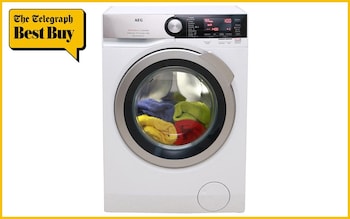
- A energy rating
- 9kg washing capacity
- 1400rpm spin speed
For a combination of drum size (9kg), energy rating (A), spin speed (1400rpm), range of options and ease of use, the AEG L7FEC946U takes our best buy spot. The energy efficiency is a result of the ProSense technology, which automatically weighs each load and adjusts the settings to provide a tailored cycle.
In practice, this means the drum rotates a few times to weigh the laundry, then a sensor decides how dirty your laundry is. When the reading is complete, the washing machine adjusts the time, water and energy consumption to the size of the load. The tailored settings not only reduce energy consumption by up to 30 per cent, according to AEG, but also helps to maintain colours and condition of fabrics, so they’re not over-washed.
If you want more control over the time of your wash, there’s a TimeSave setting, which reduces the time to wash to the minimum possible to still achieve a thorough clean. For example, 3kg of washing can run through in 20 minutes.
Other handy features include the MyMix setting, which can wash a hefty 5kg mix of cottons and synthetics at 30C in 69 minutes, a UniversalDose drawer where pods are placed in the drawer and pierced to activate faster than if they were thrown in the drum and steam settings that work post-wash to reduce ironing - this is one I particularly appreciate as someone who avoids ironing where possible.
It’s worth noting this is a freestanding washing machine – AO recommends making sure you have 7cm more than the width of the appliance (60cm) in order for it to fit comfortably. All in all, an excellent all rounder where lots of small, thoughtful features have come together to create the best washing machine for most people, at a mid-range price point.
2. Russell Hobbs RH914W116W
£314.99, Amazon
Best value washing machine, 9/10
We like: number of impressive features at a low price-point
We don’t like: long cycles won’t suit a busy family
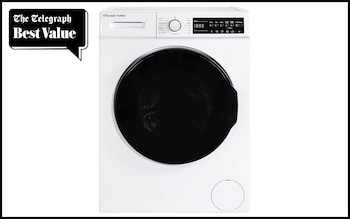
- A energy rating
- 9kg washing capacity
- 1400rpm spin speed
When choosing products to grant our best value label, we look for the product with the lowest price possible that shares the most features with a higher-end model. It’s not necessarily about finding the cheapest on the list, but it’s a happy coincidence that this one is.
This washing machine has a large capacity of 9kg, a standard spin speed of 1400rpm, 15 programme options which include an eco mode and a quick wash mode and – perhaps most importantly – an energy rating class of A. There’s also a delay mode, so you can wash clothes during cheaper energy times and steam assist, a hygiene cycle that uses steam to both keep clothes free of bacteria and viruses and reduce creases to save on ironing.
Another pro is Russell Hobbs’ ‘Boomerang’ technology, which uses an inverter in that shape. “Boomerang technology reduces the noise level and vibration, which is important for helping your machine last longer,” explains Louise Lee, buying manager at Robert Dyas. It’ll be a good fit for open plan living.
So where have the costs been cut to make this a more affordable washing machine? Well, programme times are long, if you don’t use the Rapid 15 minute programme: cotton washes can take nearer four hours and synthetics more than two, but thankfully the spin and temperature settings mean you can customise washes if you’re short on time.
My advice would be to use the delay function to stick the machine on overnight and hang clothes up in the morning. The long cycles do mean that despite the energy rating A, this washing machine is not always the cheapest to run as programmes drag on. However this is a great option for large families needing a large capacity without paying extra.
3. Hotpoint NM111046
£379, AO
Best washing machine for stain removal, 10/10
We like: large capacity for the price
We don’t like: a couple of confusing buttons
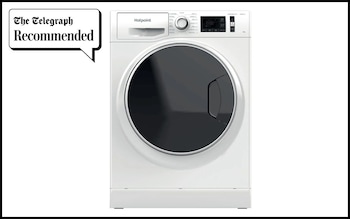
- A energy rating
- 10kg washing capacity
- 1400rpm spin speed
American company Hotpoint is a stalwart of affordable and reliable kitchen appliances, making them an excellent choice for a washing machine on the cheaper end of the scale.
Robert Dyas’ Louise Lee, who also goes by Low Cost Lou on Instagram, agrees: “There are a lot of great brands, each with different selling points, but if I had to choose one I’d say you can’t go wrong with Hotpoint. They offer affordably priced, great quality appliances that stand the test of time.”
This washing machine has a 10kg capacity, making it slightly larger than the AEG and Russell Hobbs above, although it’s still only 60cm wide. The compact size, along with the quiet pro-inverter motor (a brushless motor) means it’s a comparatively easy washing machine to fit into your living arrangements.
But where this washing machine excels is its stain removal. The ‘anti-stain’ option, which you can switch to using the dial, works without the need for pre-treatment. It removes stains in one hour at just 40C by releasing detergent into the drum, raising the temperature and using specific drum movements to get results.
Other useful technologies include Active Load, which adjusts the electricity and water load to each mode, an Anti-Allergy setting, which has been approved by Allergy UK and removes dust mites for sensitive skin, and steam modes, for hygiene and refreshes.
4. LG TurboWash 13kg F4Y513WWLN1
£749, John Lewis
Best washing machine for large families, 9/10
We like: it’s surprisingly compact given the large capacity
We don’t like: the door can be a little stiff
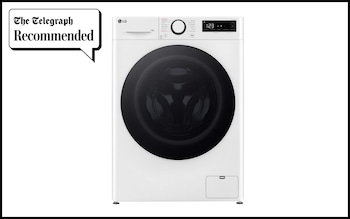
- A energy rating
- 13kg washing capacity
- 1400rpm spin speed
This washing machine has been recommended to us by owners, including a family of six who have used an LG daily for ten years. With a 13kg capacity but compact dimensions (it’s 60cm wide), an A energy rating and general durability, you can really put this one through the ringer.
Louise Lee from Robert Dyas says, “The LG Turbowash 13kg F4Y513WWLN1 Washing Machine is our second biggest seller and it’s not hard to see why. It powers through a daily load in just 39 minutes with no impact to wash quality, and LG’s Steam technology reduces allergens by up to 99.99 per cent.
“It has an A energy rating so it’ll save you money on your bills, an A rating for noise which means it’s very quiet, emitting only 72dB. However, it’s best suited to larger families due to its 13kg capacity.”
The 14 washing options include cotton, delicates, mixed and two quick cycles: Speed 14, which cleans a light wash in 14 minutes and TurboWash, which can handle a larger wash in 39 minutes. Busy families will find both to be useful.
It’s also easy to use with a modern digital display and time remaining countdown. You can easily end up spending nearer £1,000 on a large capacity washing machine, but I think this is a great combination of quality design and useful features, plus it comes with a five year guarantee.
5. Miele W1 WED164 WCS 9kg
£899, Miele
Best washing machine for an upgrade, 9/10
We like: a programme for every possible use - including waterproof jackets
We don’t like: Miele’s larger capacity washing machines are expensive
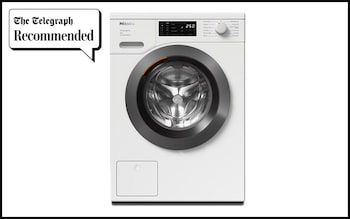
- A energy rating
- 9kg washing capacity
- 1400rpm spin speed
You’ve probably been wondering why Miele hadn’t popped up in this list yet and trust me, if the prices were a bit more affordable, this would be up top. Miele products are tested for 20 years worth of use so that any tiny flaws are ironed out before hitting the shelves. Their energy consumption is generally exemplary and the brand is known for top notch German engineering, which is evident in this washing machine.
When it comes to Miele washing machines, you can find yourself spending up to £3,000 for a top model, but I think this W1 WED164 model offers the best balance of price and performance. There’s convenient features like AddLoad, which means you can add extra clothes during the cycle, and connectivity with the Miele@home app, where you can monitor energy consumption, receive notifications when your washing is ready and customise programmes.
Automatic Load Recognition measures the load to determine the right amount of energy and water consumption for each load and the inverter motor minimises noise. Both of these features contribute to the A energy rating.
The ‘proofing’ washing machine programme is unique to Miele, which is designed to wash while preserving water-proofing. This is a good feature for hikers and dog walkers who frequently dirty waterproof trousers and coats. Other useful features include ‘outerwear’, which has a similar effect, delicates, woollens and ‘express 20’.
6. Bosch Series 6 WGG24400GB
£599, AO
Best low energy washing machine, 9/10
We like: impressively low-energy
We don’t like: some people might miss the smartphone connectivity
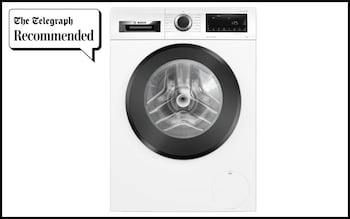
- A energy rating
- 9kg washing capacity
- 1400rpm spin speed
As is the norm with most modern washing machines – to the point I’d be disappointed if this feature wasn’t an option – this Bosch uses internal sensors to adjust the amount of water to the weight of the laundry. Bosch’s version of this is called ‘Active Water Plus’. This is primarily where the A energy rating comes from, to save on utility bills, but there’s also an EcoSilence Drive, which means the drum has frictionless magnets, and an AntiVibration design, which uses grooves in the sides to prevent noise. Even multi-brand retailer AO touts it as one of their lowest energy washing machines for sale.
As for convenience, a ‘Super Quick’ mode will wash your clothes for your choice of 15 or 30 minutes. Meanwhile pressing the ‘Speed Perfect’ button on the LCD screen will make any cycle setting up to 65 per cent faster. You can also pause and add clothes after a cycle has started, via the ‘Reload’ button.
This washing machine doesn’t have any smart connectivity, which won’t bother those of us not tied to our smartphones – but does mean you can’t control it remotely or receive notifications when washing has finished, as is the case with other models on this list. Other than that, this is a good looking, easy to use, energy efficient model with a five year warranty.
7. Samsung Series 5 11kg SpaceMax WW11BGA046AEEU
£499, Currys
Best washing machine for ease of use, 9/10
We like: classic Samsung good looks
We don’t like: it’s missing better Samsung features like AddWash, which lets you add items after washes have started
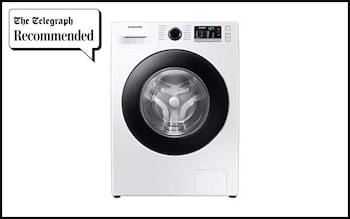
- A energy rating
- 11kg washing capacity
- 1400rpm spin speed
Samsung’s ‘SpaceMax’ technology means it has a larger drum size with the same footprint, measuring 60cm wide and deep. It’s an enticing option for anyone wanting to upgrade to a large drum size without the space to do so.
Where it really thrives is the ease of use. There are 14 pre-set options to choose from, with an LCD screen displaying estimated wash time, plus override buttons to adjust the temperature, spin speed and rinse intensity. The programme options include a 15 minute quick wash, bedding, hygiene steam and the never-failing ‘mixed load’. And as with all Samsung appliances, it looks very smart.
This is one of Samsung’s midrange models, so it misses out on higher end features like AddWash, so you can’t add missed socks part way through a wash, and there’s no SmartThings integration: that’s Samsung’s smartphone app through which you can remotely control and monitor its appliances.
But none of these are deal breakers, and echoing the words of washing machine expert Stephen Neale, you’re always better to go for a mid-range product from a high-end brand if you’re looking to save.
8. Zanussi ZWF942E3PW
£499, John Lewis
Best basic washing machine, 8/10
We like: the filter cleans itself
We don’t like: lower energy rating than competitors
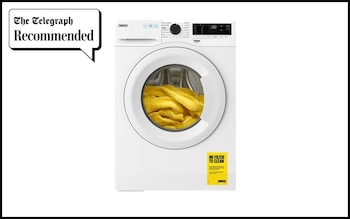
- C energy rating
- 9kg washing capacity
- 1400rpm spin speed
If you’re after a basic washing machine that’s easy to use and just gets the job done without costing the world, this Zanussi is a strong contender at a competitive price. It’s not the prettiest; there’s no flat, mirrored door and the LCD display is a little busy but the ease of use is second to none.
Let’s talk about the elephant in the room. This has a C energy rating, whereas every other washing machine on this list has an A energy rating. Yes, it has slightly higher running costs than some as a result. But it does come with ‘Autoadjust’, which uses sensors to tailor the programme to the load, so it’s not as much of an energy leach as you may think.
This Zanussi has average run time, with a synthetics wash taking just less than two hours and useful programmes include ‘14min Refresh’, ‘30min Rapid’ and ‘60min EasyWash’. An ‘Easy Iron’ option offers steam cleaning, and you can also do an extra rinse.
A small thing that I particularly like about this washing machine is that the filter is self-cleaning, thanks to the drain system. Cleaning washing machine filters is never a particularly fun job. It’s just another perk to this affordable but effective washing machine.
9. Beko Pro Aquatech B5W51041AW
£429, AO
Best washing machine for range of programmes, 8/10
We like: the tub is made from recycled bottles
We don’t like: the measly warranty period
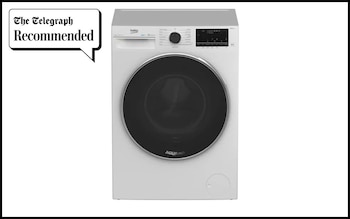
- A energy rating
- 10kg washing capacity
- 1400rpm spin speed
If I were to tell you a washing machine had a digital display, drum light, 10kg capacity, A energy rating and Bluetooth connectivity to a smartphone app, you might assume I’m talking about a high-end model. That’s what makes this Beko Pro Aquatech so special – it shares so many high-end features, at a more palatable price.
What differentiates this washing machine from the others is the tub, which is actually made from recycled bottles. This is a technique Beko uses across its laundry products. I also highly rate Beko’s Pro RecycledTub Washer-Dryer, which uses the same construction and featured in my review of the best washer-dryers.
This washing machine has a really excellent range of modes, including the usual cotton, synthetic and quick modes, plus ‘duvet’, ‘sports’ and ‘dark care’. You can pre-wash, which is useful for dealing with stains, use steam settings for hygiene and to reduce ironing and press the ‘Fast+’ button on any setting to cut the length of the cycle by up to 55 per cent.
It’s hard to see where Beko has cut costs. The exterior is perhaps a spot more plasticky than others, although there’s still a smooth flat door. The warranty is only one year, compared to other models that have five or even 10 year warranties, although there’s still a 10 year warranty on the motor. It’s a pretty good deal.
Washing machine FAQ
What is the most reliable washing machine brand?
AEG, LG and Miele are three leading brands known for durability, all of which I’ve included above, but any I’ve written about are reliable.
How much water does a washing machine use?
“On average, a household washing machine could use around 50 litres per cycle but this depends on the model type, size and wash setting,” explains Robert Dyas buying manager Louise Lee. “A lot of machines have quick 30-minute settings for clothes that aren’t heavily stained, so this would use significantly less water than a standard long wash. Eco modes will also use less water, as well as a lower temperature.”
What temperature should I wash at?
“For regular washing, 30C will do the job,” says Lee. “Not only will this clean your clothes well but it’s a lot more environmentally friendly and will save you money on your energy bills.”
However, she does recommend 40C if you’re looking to lift stains. For really tough stains, Lee recommends Oxi-Boost Stain Remover (£7.85, Amazon). “It’s eco-
friendly, easy on the wallet, and it’ll also help to prevent limescale from forming, which can
help your machine last longer, so it’s a big winner all round,” she says.
What size drum is right for me?
Neale says: “You’re better off with an 8/9kg drum – for the machines with larger drums, the drum takes up most of the machine and the other components are smaller as a result. Also, the bearings in the drum don’t last as long because they’re under more weight. I would recommend going for an 8kg with a 15 minute quick-wash cycle whatever the size of your family.”
Clark advises a larger 9-10 plus kg drum size for “households who tend to wash bulky items like towels, bathmats, bedding, blankets or even the dog’s bed... to make sure the items are getting a good wash and are able to move around the drum freely.”
One way in which buying a washing machine is easier than another home appliance or piece of furniture (like a fridge-freezer or sofa) is that they’re all standard heights and widths, give or take a few centimetres. The only difference is depth, based on the size of the drum. Drum sizes vary from 6kg to more than 10kg.
Is an integrated or freestanding washing machine better?
“Freestanding washing machines can be placed anywhere in the house and tend to feature in homes that don’t have integrated or built-in kitchens – they’re also easy to pull out to clean behind,” says Clark. “An integrated machine sits behind the cabinet doors so the appliance is hidden out of sight.”
“People like integrated machines because they have a front door that matches the rest of your kitchen, but they’re more expensive and the build quality isn’t as good as freestanding,” says Neale. Integrated washing machines also tend to have a slightly smaller drum.
The third type of washing machine is a top-loading washer, but Neale “hasn’t seen one in about 10 years – you only really find them in America. We don’t use them in this country as they’re much less environmentally friendly,” he adds. That’s why we’ve focused on freestanding models in this review.
What energy rating is best for a washing machine?
The energy efficiency of a washing machine is more important than ever now that prices have skyrocketed. Machines are rated between A and G on a new scale that replaced the confusing system of A+, A++ and A+++, etc. in 2021. Neale says to buy one rated C or above, but even more important is that it has a quick wash cycle to save both time and energy.
What spin speed is best for a washing machine?
“The spin speed is going to determine how dry your clothes come out. Most machines are now 1400 or 1600 – you definitely don’t need more than that,” Neale says. “When I use my machine I put it on 1000 anyway, so I don’t need to iron as much.”
View the latest John Lewis & Partners and Amazon deals
Disclaimer: The copyright of this article belongs to the original author. Reposting this article is solely for the purpose of information dissemination and does not constitute any investment advice. If there is any infringement, please contact us immediately. We will make corrections or deletions as necessary. Thank you.
